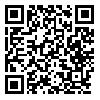شمارۀ جدید فصلنامه (زمستان 1403) منتشر شد
BibTeX | RIS | EndNote | Medlars | ProCite | Reference Manager | RefWorks
Send citation to:
URL: http://jspi.khu.ac.ir/article-1-2506-en.html
The Purpose of this study is to test the Akers’ social learning theory in explaining academic cheating among university students. Since academic cheating has not been investigated experimentally by this theory in Iranian studies; a structural model was developed based on Akers’ social learning theory in order to show the relationship between latent variables. Survey was applied as the method of this study and a questionnaire was used for gathering data. The study population was composed of male and female students at Hormozgan University in academic year 2013-14. The sample size was 410 people. Proportionate stratified random sampling method was used to distribute questionnaires. Descriptive analysis of the dependent variable showed that the prevalence of academic cheating among students is 97.4 %. So that only 2.6% stated that they never cheated so far. Based on the analysis of the structural model, the fitness of the observed data with the theoretical model was confirmed. The variables of differential association, definitions, reaction and reward had a statistically significant impact on academic cheating; while factors of praise, deterrence and imitation had no statistically significant effect. Finally, the results showed that social learning theory is able to explain academic cheating.
Received: 2016/02/24 | Accepted: 2016/02/24 | Published: 2016/02/24
| Rights and permissions | |
 |
This work is licensed under a Creative Commons Attribution-NonCommercial 4.0 International License. |






